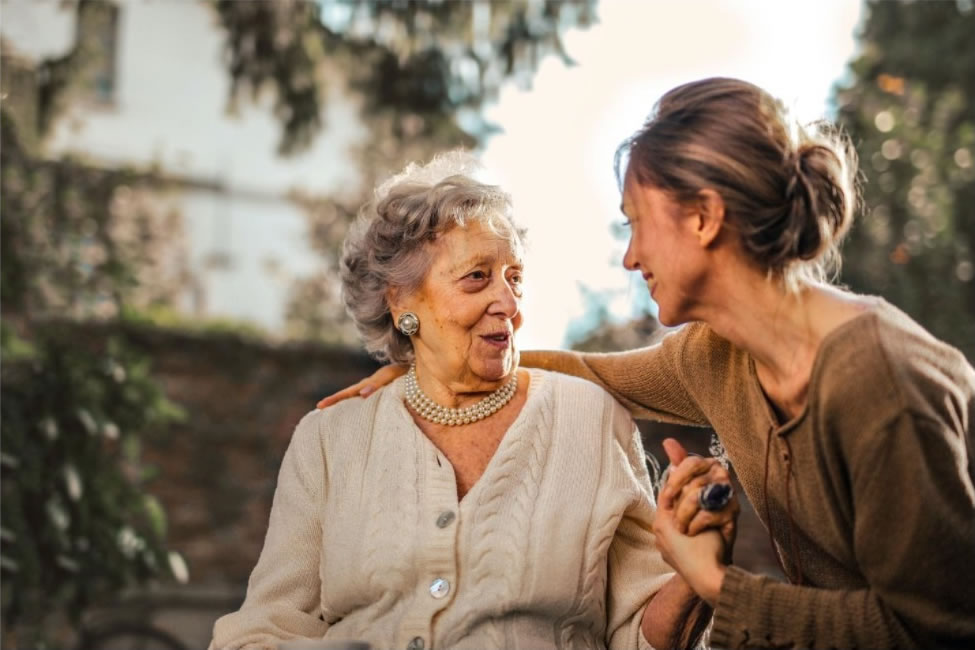Everyone knows someone—or perhaps you’re that someone—who’s had a parent with a chronic illness and suddenly needed in-home care or an older family member with no children who had a bad fall and now needs assistance.
These kinds of situations often linger on for months, sometimes years of keeping up with tasks such as:
- Prescription ordering and medication monitoring
- Navigation of insurance
- Driving to doctors’ appointments
- Getting your family member out for some sunshine or to visit a friend
- Household tasks around the older relative’s home
Even families who have the resources for in-home care must do a lot of this support work on their own. It’s exhausting.
According to the CDC, some of the effects on caregivers of caring for older family members, include:
- Higher levels of stress, depression, and anxiety
- Higher usage of psychoactive medications (e.g., antidepressants)
- Compromised immune function
- Worsening health conditions themselves
- Risk of earlier death
Add to these risks the additional strain on caregiver household resources.
Here are 10 tips for family caregivers
That’s why we’ve come up with 10 tips for family caregivers, to help you put yourself first and get all the help you need.
1. Get help for the helper.
The first thing you may experience is overwhelming like everything is on you. Perhaps there are no other siblings, family members, or reliable partners to support your older family member so you feel like you’re the only one able to give care. Stop right there and seek out support.
2. Be open with your older family member.
This can be more difficult if they have challenges understanding why they need higher levels of care. But their ability to trust your intentions is important so you need to be upfront and honest about what’s happening, from financial and medical decisions to greater oversight of their day-to-day lives. Keep in mind this person has lived independently their entire lives and maybe reluctant or afraid to relinquish responsibilities. Imagine yourself as the older relative.
3. Make small changes.
Unless there’s some reason for a complete overhaul of your older family member’s living arrangement, consider making small changes at first. Perhaps just rearranging the rugs to cover electrical cords that present tripping challenges. Or helping organize the refrigerator so it’s easier to navigate.
4. Bring some fun along.
It’s easy to fall into simply getting things done before rushing out the door again. Take time to connect with your older loved one and come up with things that are fun for both of you. A game of dominoes? A sing-along? Looking through old family albums and hearing family stories? If it sounds like too much time, it’s still worth it. You’ll look back on your time as a caregiver and know you made the best of it—for them and you.
5. Walk it off.
Everybody suggests it, for good reason. Taking a quick yet mindful power walk can put some spring in your step—and your day.
“We hear a lot about self-care these days, especially since the pandemic,” “Many of us spend years trying to master healthy behaviors like getting in a short walk or a 10-minute meditation session or a freshly prepared meal. If you didn’t make self-care a priority before, now is the time because you’re going to need it more than ever.”
6. Consider in-home technology monitoring of older relatives.
Big Brother has its benefits. One of them is being able to keep an eye on your older family member in their own home. Consider Amazon’s Echo Show or a similar device that coordinates with your smartphone and is easy for your older relative to tap and use as well.
7. Keep checking in.
Things may start out one way but as time goes on, you may need to re-evaluate. Have conversations with your older relative, leading with questions like: “What’s working? What’s not working?” and go from there.
8. Pat yourself on the back.
You’ll probably feel like it’s never enough. You can’t give enough or do enough. But keep in mind that you’re doing the best you can with where you are right now. And that is enough.
9. Explore end-of-life care and planning.
Don’t dance around it or wish it wasn’t necessary. Be sure to discuss end-of-life care with your loved one, starting with an advanced care plan.
10. Know when to pull back.
It’s okay to pull away from your duties to your older family member. Ask a trusted friend to step in on your behalf for a week or a month, whatever is needed for you to reset and recharge. If you burn out, it not only impacts your older relative but affects all aspects of your life— and it could take longer to get yourself back on track.
Know someone who needs to support caring for an older relative? Be sure to offer these 10 tips for family caregivers.


